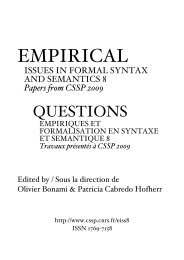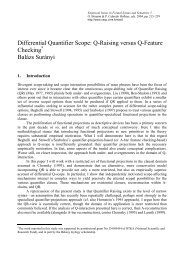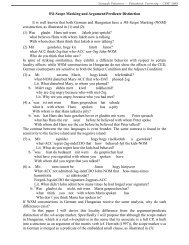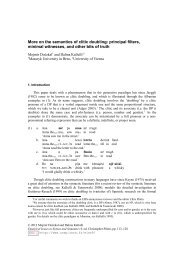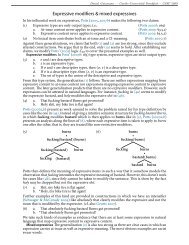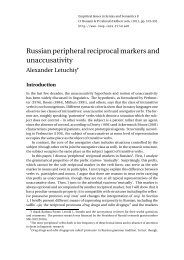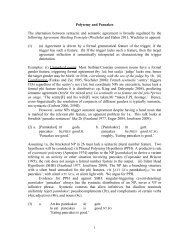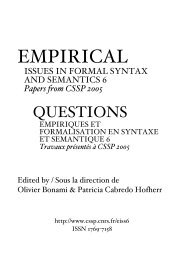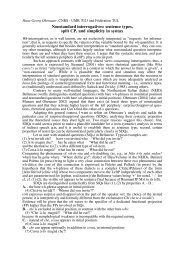Empirical Issues in Syntax and Semantics 9 (EISS 9 ... - CSSP - CNRS
Empirical Issues in Syntax and Semantics 9 (EISS 9 ... - CSSP - CNRS
Empirical Issues in Syntax and Semantics 9 (EISS 9 ... - CSSP - CNRS
Create successful ePaper yourself
Turn your PDF publications into a flip-book with our unique Google optimized e-Paper software.
to realize the imperative once he accepts this proposal.<br />
How well such a proposalist construal can account for functional heterogeneity rema<strong>in</strong>s to<br />
be seen s<strong>in</strong>ce it appears that all the <strong>in</strong>terest<strong>in</strong>g action will have to happen <strong>in</strong> the negotiation<br />
of the speaker’s proposal. It seems likely, then, that a comprehensive account of imperatives<br />
can only be developed on this basis if the fact that utterances constitute proposals is explicitly<br />
modeled. Farkas (2011) gives a variant of a Portner-style account that explicitly models the<br />
proposal character, but does not defend it as a general analysis of imperatives.<br />
We doubt that a proposalist construal will be able to account for the very uses for which a<br />
‘direct’ construal of Portner’s account is most problematic. While <strong>in</strong>vitation imperatives such as<br />
Have a cookie! no longer directly (<strong>and</strong> implausibly) commit the addressee, they will give rise to<br />
such a commitment once accepted. The same will be true for advice uses. But accept<strong>in</strong>g a piece<br />
of advice does not commit you to act on it. The basic problem rema<strong>in</strong>s.<br />
Similarly, the proposalist construal still must make essential reference to the addressee, <strong>and</strong><br />
thus is unable to account for wish uses that lack volitional addressees or addressees altogether.<br />
5.2. To-Do lists <strong>and</strong> the common ground<br />
Given that Portner assumes that imperatives target a global discourse parameter, he has to<br />
address a problem that all accounts assum<strong>in</strong>g such global parameters face, namely that the To-<br />
Do lists <strong>and</strong> the common ground need to be kept ‘<strong>in</strong> sync’. If an imperative adds someth<strong>in</strong>g<br />
to a To-Do list, then, after the utterance of an imperative, the common ground needs to reflect<br />
what just happened. And <strong>in</strong> particular, if an order was given (<strong>and</strong> the orderer had the requisite<br />
authority), the common ground should afterwards reflect the fact that a new obligation exists.<br />
However, if the dynamic effect only specifies a change <strong>in</strong> the To-Do list, this will not be ensured<br />
s<strong>in</strong>ce the common ground will be unaffected by the utterance of an imperative.<br />
Portner (2007), <strong>in</strong> order to ensure that the common ground after the utterance of an imperative<br />
p! entails the correspond<strong>in</strong>g necessity statement must(p) or should(p), proposes a two-part<br />
dynamic effect: the imperative updates the To-Do list <strong>and</strong> it also updates the common ground,<br />
effectively add<strong>in</strong>g p to the modal order<strong>in</strong>g source correspond<strong>in</strong>g to the ‘flavor’ of the imperative<br />
for all worlds <strong>in</strong> the common ground. 13 This, however, does not quite achieve the effect Portner<br />
<strong>in</strong>tends, given how order<strong>in</strong>g sources are employed <strong>in</strong> a Kratzerian semantics for modals. To see<br />
this, suppose there are worlds <strong>in</strong> the common ground at which the relevant order<strong>in</strong>g source,<br />
before the imperative utterance is made, conta<strong>in</strong>s a proposition q that is <strong>in</strong>compatible with p.<br />
Add<strong>in</strong>g p to this order<strong>in</strong>g source will not make such worlds verify must(p) s<strong>in</strong>ce there will be<br />
‘best’ worlds with respect to the order<strong>in</strong>g source <strong>in</strong> which q is true but p is not. Hence, the<br />
common ground will fail to entail must(p). In order to ensure that an utterance of p! results <strong>in</strong><br />
the common ground entail<strong>in</strong>g must(p), Portner would have to strengthen his secondary update<br />
clause to a proper update with must(p).<br />
Do<strong>in</strong>g so would have the added benefit of model<strong>in</strong>g functional heterogeneity <strong>and</strong> thus address<strong>in</strong>g<br />
our criticism of Portner’s account on this score. But then, all the work would be done<br />
by the secondary update clause, <strong>and</strong> the To-Do list construct would be rendered superfluous. Imperatives<br />
would distributively update the common ground, target<strong>in</strong>g contextually given modal<br />
order<strong>in</strong>g sources. Indeed, once Portner’s second update clause is strengthened <strong>in</strong> this way, it<br />
becomes a variant of the account by Schwager (2006) <strong>and</strong> Kaufmann (2012).<br />
13 Given his formal setup, Portner needs to stipulate an additional pr<strong>in</strong>ciple, CONVERSATIONAL BACKGROUND<br />
CONTAINS TO-DO LIST, to achieve this effect.<br />
56



